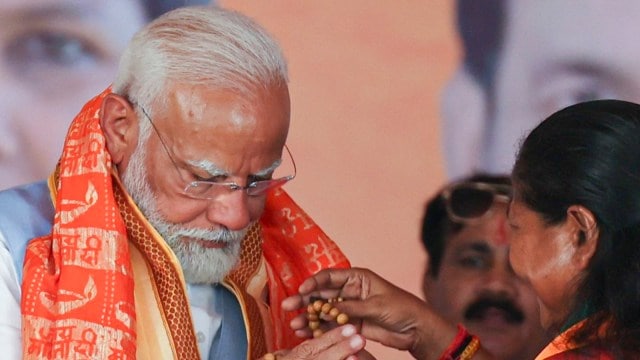
Prime Minister Narendra Modi’s comments that he does not do “Hindu-Muslim” because of his enduring commitment to the “sabka saath, sabka vishwas” policy and that he has a great faith in the truest form of secularism has provoked an interesting debate. A section of political commentators (including the journalist who conducted this interview for a television news channel) has argued that these comments reflect Modi’s emotional side and his caring attitude towards all sections of society, including Muslims. According to the critical view, on the other hand, the statements made by the PM in this interview are entirely contradictory to what he has said in a series of electoral speeches. This criticism draws its legitimacy from the fact that the second-level BJP leadership has been defending the Prime Minister’s previous controversial remarks. They do not hesitate to describe the Opposition, especially the Congress Party, as an anti-Hindu entity.
The scope of this media-driven debate on BJP’s Muslim outreach should be expanded to analyse the possible electoral implications of Modi’s recent statements. For that reason, the BJP’s 2024 electoral campaign must be seen in its entirety: The promises made in the Sankalp Patra (manifesto), identification of core voters and the strategic ways to mobilise them in favour of BJP candidates at the constituency level. The campaign has been organised in such a way that each facet of it continues to revolve around the figure of Modi. For instance, electoral promises given in the Sankalp Patra are described as “Modi ki Guarantee”; the identified voters are called “Modi ka Parivar”; and Modi is recognised as the chief campaigner in virtually every state.
It is worth noting here that the Sankalp Patra gives more emphasis to Modi-centric welfarism and underplays the Hindutva agenda. Yet, it remains silent on the question of Muslim backwardness. Even the slogan “Sabka Saath…” is used very carefully to avoid any reference to Muslim communities. This strategic omission is interesting. For almost three years, the BJP has been actively campaigning to emphasise the plight of Pasmanda Muslims. In fact, a strong impression was created that the party would use the Pasmanda outreach to expand its electoral support, especially in Uttar Pradesh and Bihar.
The BJP establishment became over-conscious just before the first phase of the election. Instead of highlighting Modi’s welfarism or “guarantees”, the party leadership decided to take up the Congress manifesto as a reference point. The manifesto was criticised for promoting separatism and Muslim appeasement. It is asserted that the Congress will restructure the affirmative action framework to provide reservation to Muslims on religious grounds. The entire campaign of the BJP eventually became Muslim-centric. The Prime Minister’s recent interview, in this sense, certainly goes against this style of electioneering.
Nevertheless, this seemingly more positive approach of the BJP towards Muslims does not deviate from the key electoral concerns of the party. It appears that the BJP leadership is now keen to invest in its own version of inclusiveness and social cohesion in the remaining phases of this election. This is understandable. The contemporary BJP is a truly professional political party. The logic of winnability, which is often invoked by senior BJP leaders to justify their strategic moves, is not entirely about the party’s stated ideological considerations. Instead, the BJP under Modi relies heavily on new and innovative ways to secure and consolidate political power on a regular basis.
From this point of view, the BJP’s support apparatus becomes very relevant. The party has the advantage of having a core ideological base, which includes the grassroots leaders, workers and voters who have been nurtured by the RSS and other ideologically affiliated organisations. This core support base allows the party to experiment at the grassroots level. The manner in which the inauguration ceremony of the Ram Temple in Ayodhya this January was publicised at the bottom level of society in various regional contexts underlines the fact that the BJP has a strong grassroots presence, which provides confidence to its leadership.
On the other hand, there is a relatively new yet expanding constituency of political support that has helped the BJP establish its dominance after 2014. The professional politicians belonging to non-BJP parties (who have joined the BJP), the professional political workers (who now work for the party) and a sizable number of new voters (who were dissatisfied with the Opposition and have abandoned them to support BJP) constitute this political constituency. Unlike the core support base, this pro-BJP political configuration is relatively fragile for two reasons. First, these political actors come from a variety of ideological orientations. There is a possibility that they do not fully subscribe to the Hindutva imagination of politics and governance. They might even dislike the anti-Muslim rhetoric and expect the party to have an inclusive outlook. Secondly, and perhaps more importantly, the professional politicians always support the successful political formation. The BJP under Narendra Modi is an attractive option for them because the party has established its political dominance. It will become hard for these leaders to remain in the BJP if the party does not do well in elections.
It is politically inevitable for the BJP establishment to address the concerns and anxieties of both constituents of the support apparatus to make the logic of winnability workable. This is precisely what the party leadership did. In the first phase of the election, the BJP tried to mobilise the traditional Hindutva voters simply to discredit the Opposition. The focus, it seems, is now shifting. The BJP would like to reach out to its newly constituted constituency of voters by highlighting Modi’s concerns for Muslims. It will be interesting to see how this multifaceted campaign contributes to the growth of the party as an institution in the long run.
The writer is associate professor, CSDS


